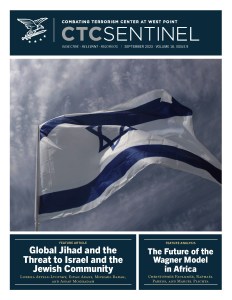From the Editor
In this month’s feature article, Lorena Atiyas-Lvovsky, Eitan Azani, Michael Barak, and Assaf Moghadam find that “jihadi rhetoric is rarely translated into violent attacks against Israeli and Jewish targets … The relative dearth of successful operations, however, has not deterred global jihadi organizations from regularly leveraging the Palestinian issue for political gain, and in order to reinforce their stature as powerful actors in the Middle Eastern and global arenas. Despite jihadi lip service to the Palestinian cause, support for global jihad among Arab Israelis and Palestinians has remained relatively low. Physical and ideological barriers erected by Israel and the Jewish community have so far limited the capacity of global jihadi actors to operate against Israel and the Jewish community.”
Christopher Faulkner, Raphael Parens, and Marcel Plichta explore the future of the Wagner Group in Africa after the death of its founder, Yevgeny Prigozhin. They write: “Wagner personnel in Africa appear poised to carry on their original missions given the importance of the continent to Russia’s broader strategic ambitions. Though the mercenary mutiny and Prigozhin’s death may lead clients to raise questions about what a continued partnership with Wagner means for relations with the Kremlin, Moscow has signaled a tolerance, if not need, for Wagner or a Wagner-like entity in Africa. Abandoning Wagner clients would severely undermine Russia’s influence on the continent.”
Aaron Zelin and Devorah Margolin explore the Islamic State’s shadow governance in eastern Syria since the group lost its last piece of territory in the country in 2019. They write: “While it is true that the organization’s insurgency has been degraded in recent years, only focusing on the Islamic State’s attack claims and propaganda misses an important trend happening at the local level: … the Islamic State has continued attempts to govern as shadow actors in eastern Syria.” They warn that thanks to these efforts, “even if it sounds far-fetched now, a reasonable worst-case scenario is that the Islamic State could rapidly take advantage of a changed local context to attempt to carve out a small statelet in eastern Syria again.”
Paul Cruickshank, Editor in Chief
 Skip to content
Skip to content

